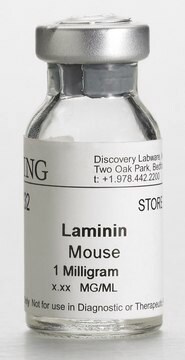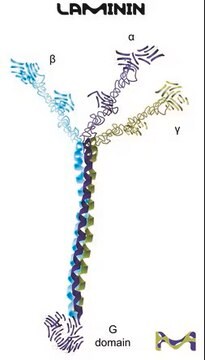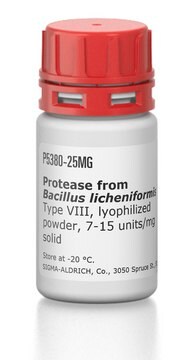CC145
Rat Laminin-5
About This Item
Produits recommandés
Source biologique
rat
Niveau de qualité
Pureté
>95% (SDS-PAGE)
Forme
liquid
Fabricant/nom de marque
Chemicon®
Technique(s)
cell culture | mammalian: suitable
Entrée
sample type neural stem cell(s)
sample type induced pluripotent stem cell(s)
sample type epithelial cells
sample type pancreatic stem cell(s)
sample type: mouse embryonic stem cell(s)
sample type mesenchymal stem cell(s)
sample type hematopoietic stem cell(s)
Numéro d'accès UniProt
Conditions d'expédition
dry ice
Température de stockage
−70°C
Informations sur le gène
rat ... Lama5(140433)
Catégories apparentées
Description générale
Application
Optimal dilutions must be determined by end user
Forme physique
Stockage et stabilité
Autres remarques
Informations légales
Clause de non-responsabilité
Code de la classe de stockage
12 - Non Combustible Liquids
Classe de danger pour l'eau (WGK)
WGK 2
Point d'éclair (°F)
Not applicable
Point d'éclair (°C)
Not applicable
Certificats d'analyse (COA)
Recherchez un Certificats d'analyse (COA) en saisissant le numéro de lot du produit. Les numéros de lot figurent sur l'étiquette du produit après les mots "Lot" ou "Batch".
Déjà en possession de ce produit ?
Retrouvez la documentation relative aux produits que vous avez récemment achetés dans la Bibliothèque de documents.
Articles
Extracellular matrix proteins such as laminin, collagen, and fibronectin can be used as cell attachment substrates in cell culture.
Protocoles
Coating surfaces with laminin for culturing cells requires specific conditions for optimal results. Protocols for coating coverslips to culture neurospheres and general cell culture are included.
This page covers the ECM coating protocols developed for four types of ECMs on Millicell®-CM inserts, Collagen Type 1, Fibronectin, Laminin, and Matrigel.
Notre équipe de scientifiques dispose d'une expérience dans tous les secteurs de la recherche, notamment en sciences de la vie, science des matériaux, synthèse chimique, chromatographie, analyse et dans de nombreux autres domaines..
Contacter notre Service technique




